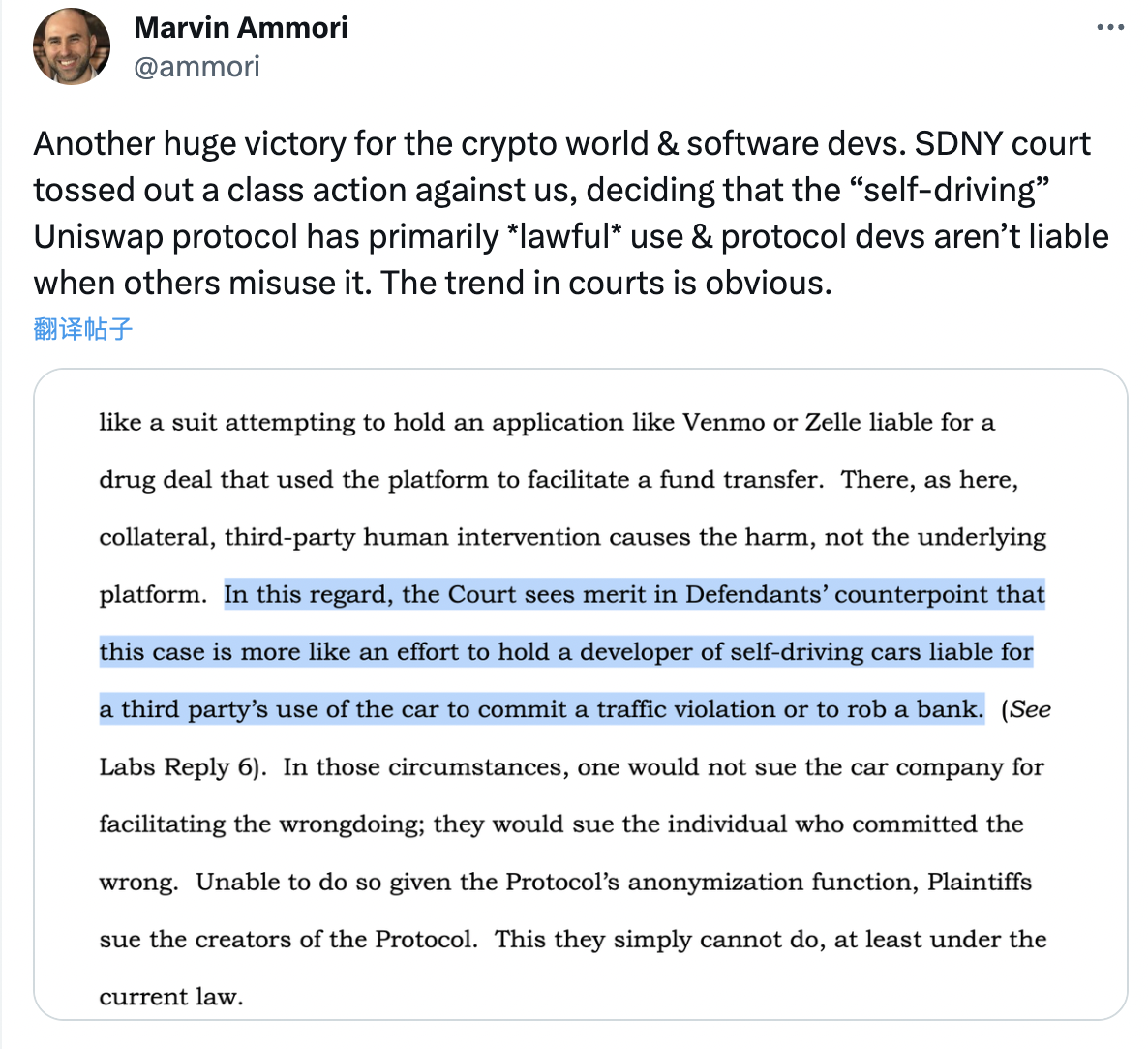
Author: Joy, LianGuaiNews
Cryptocurrency institutions have won consecutive victories in court. After Grayscale won the lawsuit against the SEC, Uniswap also won a collective lawsuit filed by investors.
The judge believed that the current cryptocurrency regulations did not provide a basis for the plaintiffs’ claims. According to current U.S. securities laws, Uniswap is not responsible for any damages caused by the misuse of the protocol by third parties, and their claims were dismissed.
- Financial Times How do industry insiders view Grayscale’s victory? How much impact will it have on the future regulation by the US SEC?
- Financial Times Will LianGuaiyLianGuail’s issuance of stablecoin repeat Facebook’s mistakes?
- Understanding the Release Process and Functional Updates of Chainlink Staking v0.2 in One Article
Investors sue Uniswap due to losses in transactions
Previously, a group of investors from North Carolina and Idaho, as well as New York and Australia, collectively sued Uniswap Labs, its founder Hayden Adams, its venture capital firm LianGuairadigm, Andreessen Horowitz, and USV in accordance with federal securities laws, and filed claims.
The investors claimed that the tokens they purchased through the protocol between December 2020 and March 2022 were proven to be fraudulent, resulting in their financial losses. Investor Nessa Risley claimed to have lost about $10,000 after purchasing fraudulent tokens such as BoomBaby, Rocket Bunny, and Matrix Samurai.
The investors also believed that the decentralized exchange sold unregistered securities and that Uniswap is an exchange or broker-dealer that is not registered with regulatory authorities. However, Uniswap disagrees with being labeled as an “exchange” or “broker or dealer.”
In the lawsuit, Chief Judge Katherine Polk Failla acknowledged the investors’ claim that the tokens in this case are “genuine” securities. However, this recognition did not help them win the lawsuit. The judge also stated that Uniswap’s ability to collect transaction fees and other aspects, such as governance tokens, was not sufficient to convincingly establish the developer of the trading platform’s liability.
The court documents stated, “The court fully rejects the appeal.” and explained that just because investors purchased fraudulent tokens on Uniswap does not mean that the decentralized protocol itself should bear responsibility, “due to the decentralized nature of the protocol, the identity of the issuers of fraudulent tokens is essentially unknown and unknowable, causing identifiable harm to the plaintiffs but without identifiable defendants.”
Judge says current policies are insufficient, lack precedent
As a judge with extensive experience in handling cryptocurrency cases, Judge Failla has previously presided over lawsuits against Coinbase by the SEC. She has also had experience overseeing other cryptocurrency cases, including those involving Tether and Bitfinex. Her ruling also highlights her in-depth understanding of cryptocurrency projects.
She believes that the decentralized nature of Uniswap means that the protocol cannot control which tokens are listed on the platform or who can interact with it. She also stated, “These underlying smart contracts are distinct from the overall code provided by the defendants and are token pair or token transaction contracts created by issuers themselves.”
To better explain, Judge Failla also made several analogies, such as using payment applications Venmo and Zelle as examples. The plaintiff’s lawsuit is equivalent to trying to hold the companies that facilitate drug transactions on their platforms responsible, rather than the drug dealers. She also compared the case to holding developers of self-driving cars responsible for the actions of third parties using the car, such as traffic violations or bank robberies.
At the same time, Failla acknowledged the lack of precedent around DeFi protocols, stating that “no court has yet ruled on this issue in the context of smart contracts in decentralized protocols.”
The application of securities law to DeFi lacks clarity. The court did not find a legal avenue to hold Uniswap Labs or venture capital firms liable under federal securities laws, stating that “laws are currently being developed around these exchanges, and regulatory agencies may one day address this gray area.” In addition, she suggested that concerns about federal securities laws should be brought to Congress rather than to her court.
In the ruling, the judge also cited SEC Chairman Gary Gensler’s statement in September 2021, in which he hinted at stricter scrutiny of DeFi projects. The SEC had initiated an investigation into Uniswap Labs at that time but apparently did not take further action.
However, she went on to state that the core smart contracts of Uniswap are fundamentally not illegal and that, for other tokens, they “can perform legally, just like transactions with cryptocurrency commodities like ETH and Bitcoin.” In this statement, the judge specifically mentioned the commodity nature of ETH.
Although Judge Failla’s comments did not provide a definitive ruling on the legal classification of Ethereum in the United States, they do indicate a certain stance and are a rebuttal to Gensler, who had previously only acknowledged the commodity nature of Bitcoin and considered all other cryptocurrencies as securities, thereby subjecting them to SEC jurisdiction.
DeFi Applications Face Regulatory Challenges, Uniswap Provides Regulatory Sample
Marvin Ammori, Chief Legal Officer (CLO) of Uniswap Labs, expressed approval of this legal victory. He believes it is another significant win for the crypto world and software developers. The SDNY court dismissed the class-action lawsuit against us, ruling that the “self-driving” Uniswap protocol is primarily used for “legitimate” purposes, and the protocol developers are not responsible when others misuse the protocol. The trend in the court is evident.

In fact, Uniswap’s “victory” comes after the Tornado Cash incident, where the U.S. Department of Justice accused Tornado Cash founders Roman Storm and Roman Semenov of conspiring to launder money, violating sanctions, and operating an unlicensed money transfer business. Roman Storm has been arrested and released on bail. However, as a DeFi application that provides mixing services, Tornado Cash’s situation seems less than ideal.
The Anti-Money Laundering Association (ACAMS) Senior Director of Anti-Money Laundering, Craig Timm, said that the Department of Justice seems to specifically point out the issue with the user interface in the Tornado Cash case, rather than the smart contract itself. It seems unlikely that charges would be brought without a user interface.
Tornado Cash’s native token, TORN, is another detrimental factor. Former financial crime prosecutor Anand Sithian stated that according to the indictment, the defendants profited from the operation of the Tornado Cash service using this token. The document cites messages they allegedly sent to each other discussing the necessity of raising the price of TORN.
So while the US government only considers 7% of all activities conducted through this service as illegal, the profits brought by the Tornado Cash token TORN may add an extra layer of liability to the founders. Perhaps the illegal activities taking place on the Tornado Cash platform are not as extensive as imagined, but the court will now focus on the profits, as the Tornado Cash founders have a clear profit motive.
Currently, Uniswap seems to be in a relatively “favorable” position in terms of US regulation. It has previously cooperated with regulatory agencies to block the user frontend interface of certain privacy tokens and the tokens themselves have always only had governance functions. This may provide a model for other DeFi projects to deal with regulation.
Like what you're reading? Subscribe to our top stories.
We will continue to update Gambling Chain; if you have any questions or suggestions, please contact us!